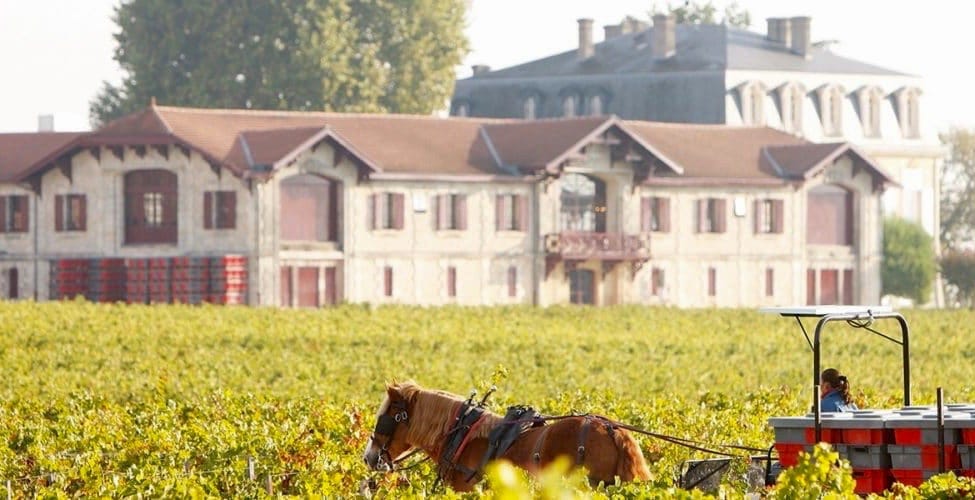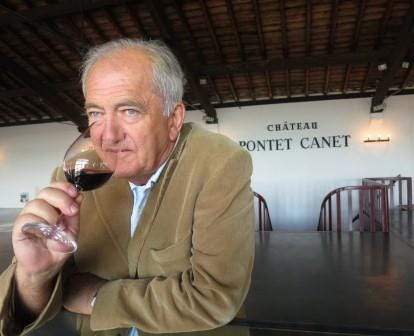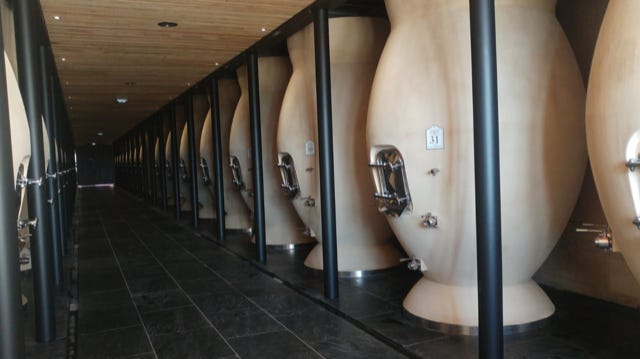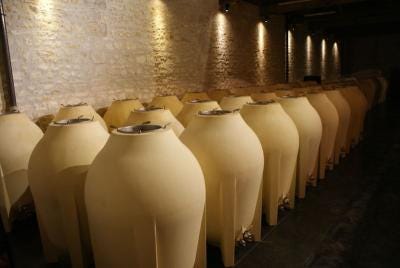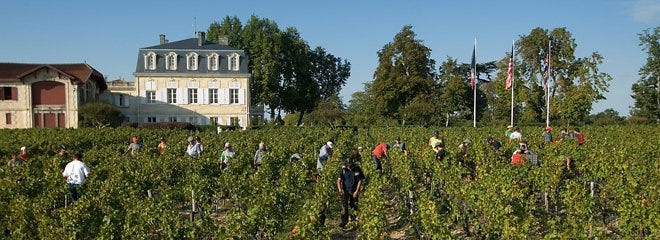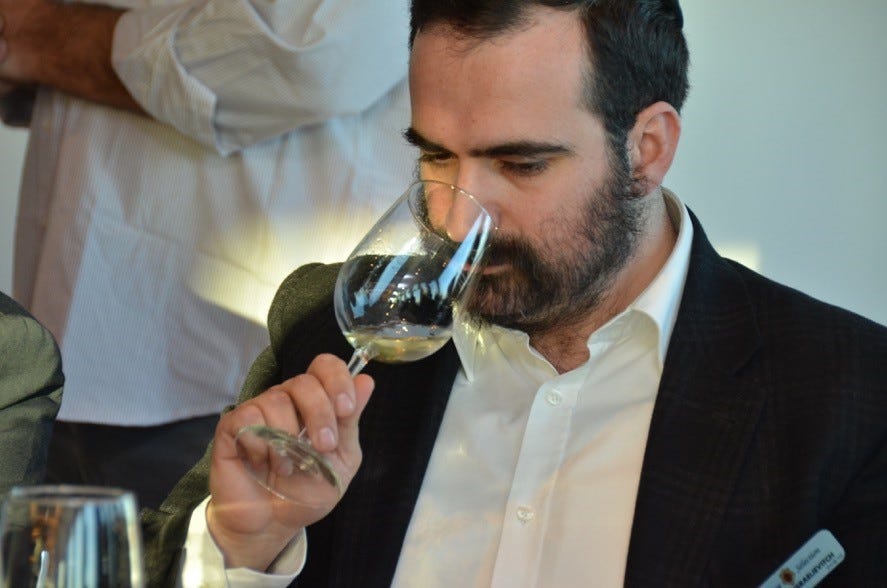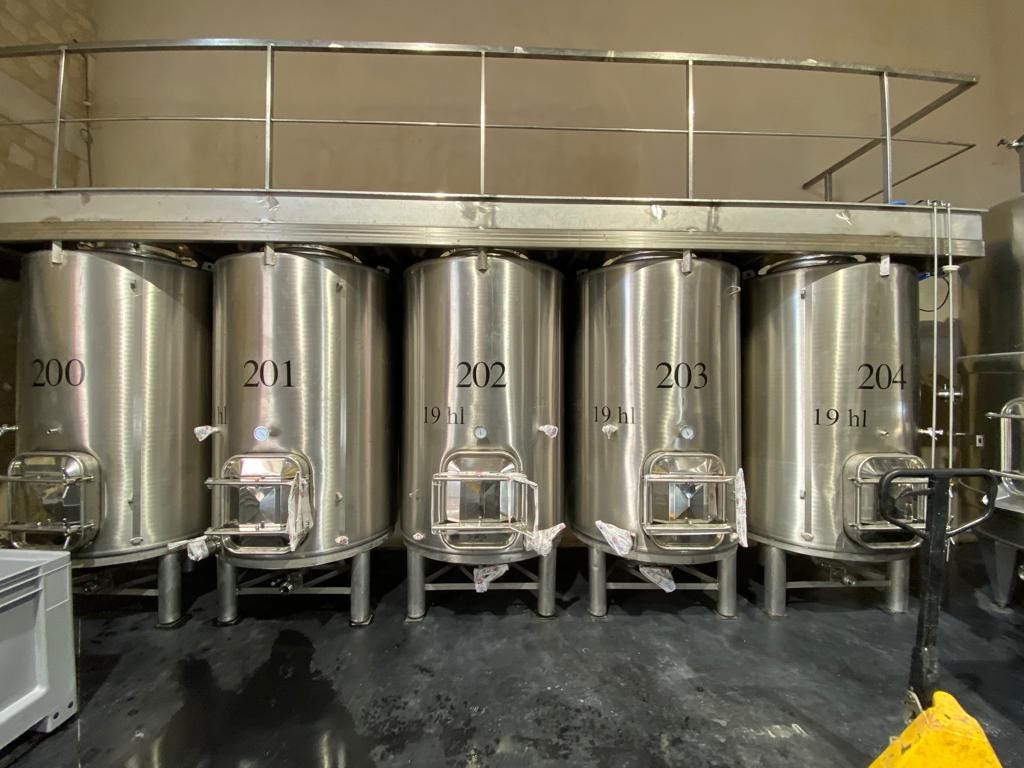A slightly shorter version of this article was written for, and published in, the Passover 2022/5782 issue of the DiVine magazine insert, which is published by the Royal Wine Corporation and distributed in the Yom Tov issues of the Hamodia, Jewish Link, New Jersey Jewish News, Yated Ne'eman (Lakewood only,) and the 5 Towns Jewish Times newspapers. It will also be distributed again in the Shavuot Edition of Mishpacha magazine in the United States. Back issues of the magazine, an annual that has ben published since 2015, can be found here. I think I’ve written for every English edition so far.
One of the most exciting recent developments in the world of kosher wine—at least to collectors and my fellow wine geeks—is the return of Château Pontet-Canet, with the 2022 release of its newest kosher cuvée from the 2019 vintage.
Château Pontet-Canet is one of the largest of the just 61 Grand Cru Classé (Great Classified Growth) estates in the Médoc district of Bordeaux, and is also widely considered one of the region’s best producers. Though the estate is blessed with exceptional terroir, what has truly propelled Pontet-Canet is the vision, tenacity, and hard work of owner Alfred Tesseron. Without his efforts, the property’s true potential would undoubtedly remain untapped.
Château Pontet-Canet’s history can be traced back to 1757, when Jean-François de Pontet, then governor-general of the Médoc, bought the “Cannet” estate (the original spelling can still be seen on a lintel in the cuverie) and, as was the custom of the age, appended his name to it. Château Pontet-Canet was officially born in 1781.
The estate prospered during the next century, earning a Cinquièmes Crus, or Fifth Growth, classification in the famous 1855 Classification of the Médoc. The estate was later acquired by Hermann Cruse, an influential Bordeaux négociant, in 1865. The Cruse family further invested in and improved the estate, and the winery continued to prosper for most of their stewardship. By the 1970s, however, the Cruse family were ready to move on.
Guy Tesseron, a wine grower and respected négociant in Cognac, acquired Château Pontet-Canet in 1975. His son, Alfred, began fully managing the property in 1994, and almost immediately initiated substantial changes to unlock the property’s potential more fully. Indeed, every vintage since has been widely recognized by wine critics as evidence of, in the words of the Wine Advocate’s Robert Parker, a “profound evolution in quality.”
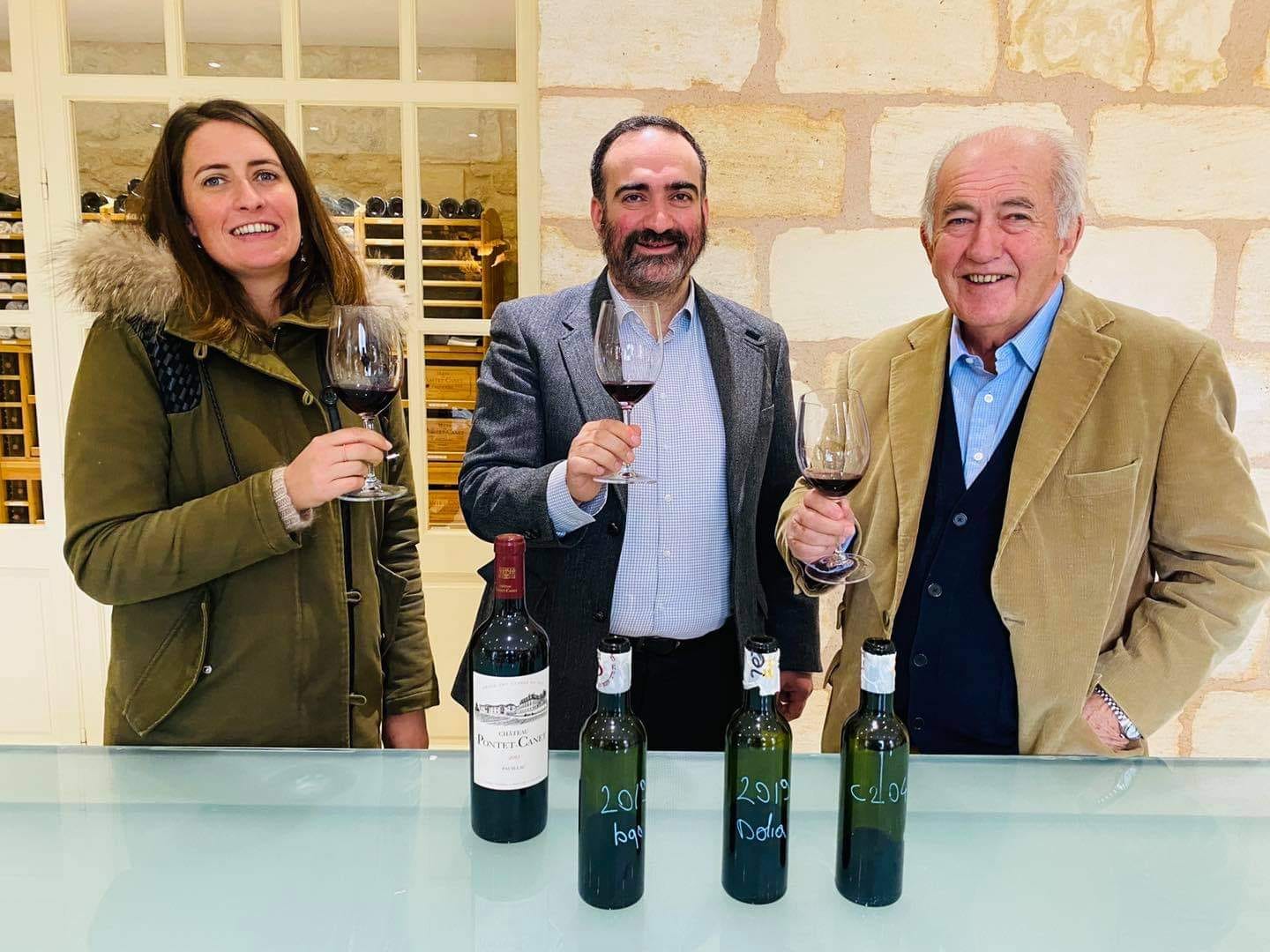
In the early 2000s, the Herzog family’s Royal Wine Corp. began working with Château Pontet-Canet to produce kosher cuvées. “Having lived many years in the US,” Alfred Tesseron informed me,
“I found that there was a big interest for the kosher wines and we couldn’t find so many great ones and so, when I got back to France, I decided to work on the feasibility to produce a special kosher cuvée with the same care that we brought to our Grand Vin of Pontet-Canet.”
While sales were good, and the critical reception of those kosher wines were solid, the project only lasted a few vintages. “We had to focus,” said Tesseron, “on the quality of our global production,” and so the kosher program was suspended while “we did some major investments at the château and at the same moment we decided to convert our viticulture into organic and biodynamic.”
“In 2004,” Tesseron explained, “the decision was taken to convert the entire vineyard to biodynamics and in 2010, the wines of Pontet-Canet were certified organic and biodynamic.” Château Pontet-Canet thus became the first Grand Cru Classé of the Left Bank to achieve both organic and biodynamic certification for 100% of its vineyards (81 hectares or 200 acres).
While biodynamics has now become more fashionable, Tesseron pursued this conversion back when the approach was heavily ridiculed by most Bordeaux producers.
Biodynamics
Essentially a farming philosophy, Biodynamics is a form of organic viticulture, based on a series of lectures given in 1924 by Rudolf Steiner (1861–1925), an Austrian philosopher. Part of biodynamics—the more heavily criticized part—is the notion that a farm is a living system, influenced by planets, lunar cycles and related “formative forces.” In viticultural terms, biodynamics calls for vineyards to become a self-sustaining “farm organism” or, if you will, an individual. This also entails regular treatments of nine herb- and mineral-based biodynamic “preparations.” Also, essential tasks, such as planting, pruning, ploughing, and picking ought to be so timed as to better harness the beneficial “formative forces” exerted by earthly and celestial—particularly lunar—rhythms.
While awakened sensitivity to natural forces is all well and good, likely of greatest import is that biodynamic viticulture insists that wine be grown and produced free of chemicals, synthetic additives, and pesticides. The focus is on ecological health of both the soils and the vines.
Why biodynamics? “I always found,” said Tesseron, “that biodynamic wines, in great terroirs, were stunning” and, of course, “making greater wines is my main involvement” and interest. Some of the more odd or extreme ideas of Steiner’s biodynamics philosophy are less relevant— “I was more drawn by the results of biodynamics on our wine,” he explained, “the quality of the wine leads our work” and, “on top of all this, mother nature is happy.”
Château Pontet-Canet instituted other substantial transformations too. “In order to avoid compressing the soils with heavy straddling tractors and to preserve our old vines,” noted Tesseron, they decided in 2008 “to return to the use of work horses.” Presently, there are 9 of these horses covering “half of our vineyard” and their “ultimate objective is to completely eliminate the use of tractors” across the rest of their vineyards too.
“As part of our permanent search for natural solutions in the regulation of our soils and through consistent respect for the essence of our terroir,” Tesseron added, in 2021 they set up an “herbal tea room” to,
“carry out all our biodynamic preparations, infusions, decoctions, plant dustings and Sulphur and copper-based mixtures. These plants are sourced from within the nearby natural environment, such as in vine rows or on land adjacent to the vines.”
There were other major changes instituted as well. In 2005, for example, they began installing smaller fermenters “to permit a more precise parcel vinification,” and their most recent “vinification cellar, first used in 2017, is a further step towards greater precision and ‘handmade’ winemaking. It has concrete vats of 40 hectoliters in size and fully integrate our biodynamic philosophy.” They also built, in 2012, “concrete amphorae to age our wine after vinification.”
This was all in the pursuit of a “return to natural methods and simplicity” and so now their wines are “aged in new oak barrels for 50% of the production, with another 15% aged in ‘one-wine’ barrels and since 2012 around 35% in concrete amphoras. This new direction arose from a desire to produce wines stripped of all artifice, to transmit form the grapes, then into the wine, the unaltered soul of each terroir. The concrete walls of each amphora contain elements of Pontet-Canet’s soil, be it gravel or limestone, to extend the terroir into the cellars.”
With this dramatic transformation substantially completed, there was breathing space once again for other projects—like making kosher wine.
Qualitative Transformation Too
Château Pontet-Canet had indeed undergone a tremendous change in the interim period, not just in terms of the physical and technical changes to the winery and the viticulture of their vineyards, but—more importantly—to the quality of the wines they produced.
The late Michael Broadbent, MW, for example, was not such a fan of the estate in its late 20th century period, but by the the 2000 vintage, as noted in his 2002 Michael Broadbent's Vintage Wine book, he began appreciating its newest wines:
“Over the years an uneven performer, and even a decade ago I noted, and did not like, its strong tarry character. Though still a touch of ‘tar’ on the nose and palate, [this 2000 is] a rich, well-constituted wine with depth and length.”
By the 2003 vintage, Broadbent was altogether more positive. As he noted in his 2007 Michael Broadbent's Pocket Vintage Wine Companion: Over Fifty Years of Tasting Over Three Centuries of Wine:
“Very deep, fairly intense; rich, fragrant; fairly sweet, chunky fruit, decent mouthfeel. Immensely impressive.”
For the 2005 vintage Broadbent commented:
“Opaque; fragrant, high-toned; very sweet nose and palate, delicious fruit and flavour, good tannin and acidity. Best ever?”
Meanwhile, the more appreciative American wine critic—and far more influential to the global wine investor market—Robert Parker awarded the 2009 Pontet-Canet his much coveted 100 points (on a 100-point scale), commenting:
“An amazing wine in every sense, this classic, full-bodied Pauillac is the quintessential Pontet-Canet from proprietor Alfred Tesseron, who continues to reduce yields and farms his vineyards biodynamically - a rarity in Bordeaux. Black as a moonless night, the 2009 Pontet-Canet offers up notes of incense, graphite, smoke, licorice, creme de cassis and blackberries. A wine of irrefutable purity, laser-like precision, colossal weight and richness, and sensational freshness, this is a tour de force in winemaking that is capable of lasting 50 or more years. The tannins are elevated, but they are sweet and beautifully integrated as are the acidity, wood and alcohol (which must be in excess of 14%). This vineyard, which is situated on the high plateau of Pauillac adjacent to Mouton Rothschild, appears to have done everything perfectly in 2009. This cuvee should shut down in the cellar and re-open in a decade or more. Anticipated maturity: 2025-2075”
Kosher Production Resumes
“Every year since 2011,” said Menahem Israelievitch, Chief European winemaker for the Royal Wine Corp., “I’ve been asking them at Château Pontet-Canet to resume kosher production.”
“I had maintained very good relations with them,” he explained, “so it was always friendly anyway” but “because of their ongoing transformation to biodynamics” they always managed to push that conversation off. “I never gave up though,” Israelievitch noted, “and eventually” around the end of the 2018 harvest, they became more responsive.
“So, when I came back to them in the beginning of 2019,” he said, “they finally told me that they were ready to engage” and the transformation of their winery was basically complete.
“The previous production,” said Israelievitch,
“was essentially in a different winery—with all the dramatic changes and investments, the property has attained and maintained a dramatically improved level of quality, and reputation. So, he told me that if they are to resume kosher, it must be at the exact same level. Exactly the same. No compromises.”
The Kosher Edition of the 2019 Vintage
“We have invested in very small fermenters to meet with the kosher needs,” said Tesseron, “and to continue to improve the quality of this special cuvée as we did for the Grand Vin.”
“To make this work,” Israelievitch elaborated,
“they decided to build like a mini winery within their winery, to facilitate the kosher production. This is a unique and really special thing – nothing else quite like it that I know of. It includes a small tank room with five different small tanks to make the vinification, and also has a small cellar.”
Further, at Château Pontet-Canet the winery was designed to incorporate gravity instead of pumps for grapes and must. Thus, the lovingly and rather precisely hand-harvested, hand-sorted, and hand-destemmed grape berries could naturally fall from the sorting table into the fermentation tanks situated just beneath the first floor. This feature was also recreated for the kosher-production mini-winery. As Israelievitch put it, “this new, purpose built kosher micro-winery exactly replicates their processes and set-up. It is really impressive!”
Where most other wineries have a din of whirring machines, Château Pontet-Canet enjoys relative silence. It is almost as if the winery has been anachronistically unplugged, working as it must have in generations past.
“Even though this makes it a not inexpensive process,” explained Israelievitch, “they took our production so seriously that I obviously felt compelled to make it a priority, so that we kept up our end to help make this really successful.”
“Yes,” Tesseron noted, “we did our kosher production exactly the same but all the decisions during the winemaking process are taken with a tasting glass in hand!”
“We are very happy with the resumption of our kosher wine,” said Tesseron, and “the resulting wine is so great that in some blind tastings some people have a preference for it.”
My Tasting Note
I had the great fortune to taste this wine while attending the 16th annual Kosher Food & Wine Experience (KFWE), held this last March at the Hilton Meadowlands in East Rutherford New Jersey. Between it suggested retail price of $250 per bottle and its limited availability (since only 3,000 bottles were even produced), this is not a wine that most of us are likely to run across casually.
Still for those of you with sufficient discretionary income, or those curious to know my impressions, here’s what I thought of the of this particular wine:
Château Pontet-Canet, Pauillac, Bordeaux, 2019 (Kosher Edition):
Though young and still rather closed, this is immense and intense with dark berry fruits, and various spices and dried floral aromas; on the palate, it opens and unfolds slowly, though already with a very clear sense of structure and power, verging on swagger, yet also with some lovely finesse and subtlety. More red and dark fruits, in turns opulent and ripe, as well as some dark chocolate and coffee bean notes, and a drying edge of black pepper and assorted spices. Layered and complex, and with a long and immensely satisfying finish. Superb.
May be enjoyed now, though allow it plenty of time—hours—to air out and open; it should otherwise really be entering its prime drinking window around 2028 or 2029. If storing until then, please provide it proper cellaring conditions—it will reward your efforts.
About me:
By way of background, I have been drinking, writing, consulting, and speaking professionally about kosher wines and spirits for more than 20 years. For over a dozen years I wrote a weekly column on kosher wines and spirits that appeared in several Jewish publications, and my writing generally has appeared in a wide variety of both Jewish and non-Jewish print and online media. A frequent public speaker, I regularly lead tutored tastings and conduct wine and spirits education and appreciation programs. Those interested in contacting me for articles or events can do so at jlondon75@gmail.com.
In what seems like a lifetime ago, I also wrote an entirely unrelated slice of American history: Victory in Tripoli: How America’s War with the Barbary Pirates Established the U.S. Navy and Shaped a Nation (John Wiley & Sons, 2005).
These days I divide my time between London (UK), and Washington, DC.



